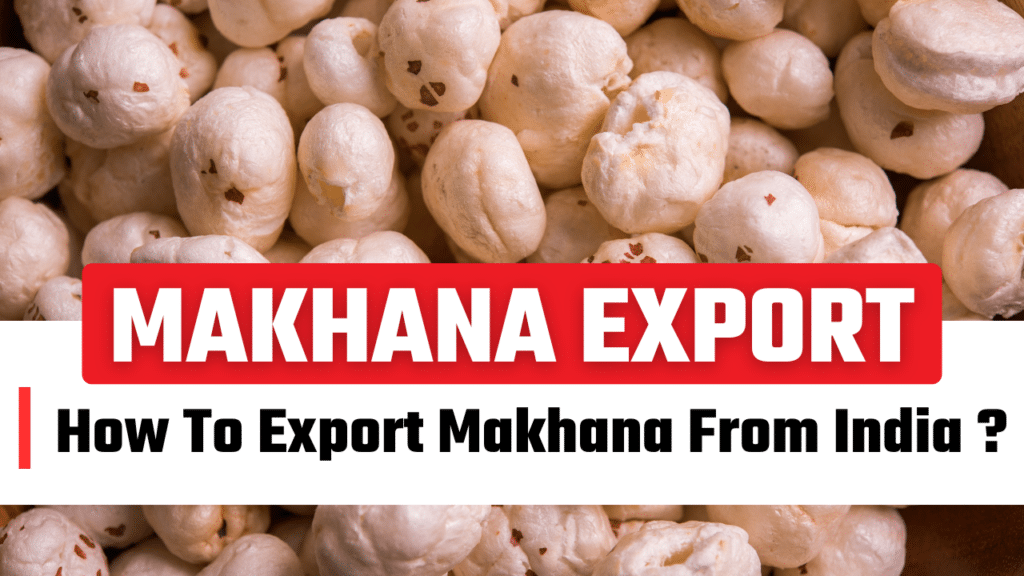OP Import Export Business Ideas for Sellers in India
Harsh Dhawan Export Experts Global OP Import Export Business Ideas for Sellers in India OP Import Export Business Ideas..
Harsh Dhawan
Makhana Export From India, also known as foxnut or lotus seed, holds a significant place in Indian culture and cuisine. In recent years, there has been a growing interest in exporting Makhana from India to international markets. This article delves into the process of exporting Makhana and explores the opportunities and challenges associated with it.

Makhana is the seed of the lotus flower, harvested from the ponds and lakes of Eastern India, particularly in states like Bihar, Jharkhand, and Assam. It is a nutritious and versatile ingredient used in various culinary preparations, including snacks, sweets, and curries.
Makhana holds cultural significance in Indian traditions, often used in religious ceremonies and festivals. Moreover, its nutritional profile, rich in protein, fiber, and minerals, has led to its popularity as a health food in Indian households.
The demand for Makhana has been steadily rising in international markets due to its perceived health benefits and exotic appeal. Countries like the United States, Canada, Europe, and Southeast Asia have shown a growing interest in incorporating Makhana into their cuisines.

Makhana is recognized for its numerous health benefits, including aiding digestion, promoting weight loss, and improving heart health. As consumers worldwide become more health-conscious, the demand for nutritious and natural snacks like Makhana continues to soar.
Exporting Makhana involves several crucial steps to ensure compliance with regulations and meet quality standards.
Before venturing into Makhana export, it is essential to conduct thorough market research to identify potential markets and understand consumer preferences and regulations in those regions.
Exporters must adhere to the export regulations and standards set by the government and regulatory bodies to ensure the quality and safety of Makhana products.
Sourcing high-quality Makhana from reliable suppliers and implementing strict quality control measures throughout the procurement process is vital for maintaining product integrity.
Proper packaging and labeling are crucial for Makhana export to ensure product protection, compliance with labeling regulations, and attractive presentation to consumers.
Efficient logistics planning and reliable shipping partners are essential for timely delivery and minimizing the risk of damage during transit.
Despite the promising growth prospects, Makhana export faces several challenges that exporters need to address effectively.
The seasonal availability of Makhana poses challenges in maintaining a steady supply throughout the year, requiring strategic planning and storage solutions.
Fluctuations in Makhana prices due to factors like weather conditions and market demand can impact export profitability and competitiveness.
India faces competition from other Makhana-exporting countries like China and Japan, necessitating efforts to differentiate Indian Makhana products based on quality and uniqueness.
The introduction of innovative Makhana-based products like flavored snacks, ready-to-eat meals, and Makhana-based desserts presents new opportunities for market expansion and diversification.
Exploring emerging markets in regions like Latin America, Africa, and the Middle East offers untapped potential for Makhana exporters to expand their global footprint.
In conclusion, exporting Makhana from India presents a lucrative opportunity for entrepreneurs and businesses looking to capitalize on the growing demand for healthy and exotic snacks. By understanding the export process, addressing challenges, and leveraging emerging trends, exporters can unlock the full potential of the Makhana market on a global scale.
Makhana is gluten-free and low in calories, making it suitable for consumers with gluten intolerance or following a weight-loss diet.
Properly packaged and stored Makhana products can have a shelf life of up to six months to a year, depending on storage conditions.
Exporters may need certifications such as FSSAI, HACCP, or organic certification, depending on the target market’s regulations and consumer preferences.
Exporters can explore options like storage facilities, contract farming, or sourcing from multiple regions to ensure a steady supply throughout the year.
The United States, Canada, European countries, and Southeast Asian markets are among the popular destinations for Makhana exports due to their growing demand for healthy snacks.
Harsh Dhawan Export Experts Global OP Import Export Business Ideas for Sellers in India OP Import Export Business Ideas..
Harsh Dhawan Export Experts Global Which is the Best Academy in India for Import-Export Training ? Which is the Best Academy..
Harsh Dhawan Export Experts Global What is Import Export Business? What is Import Export Business? Let’s break this down step-by-step..
